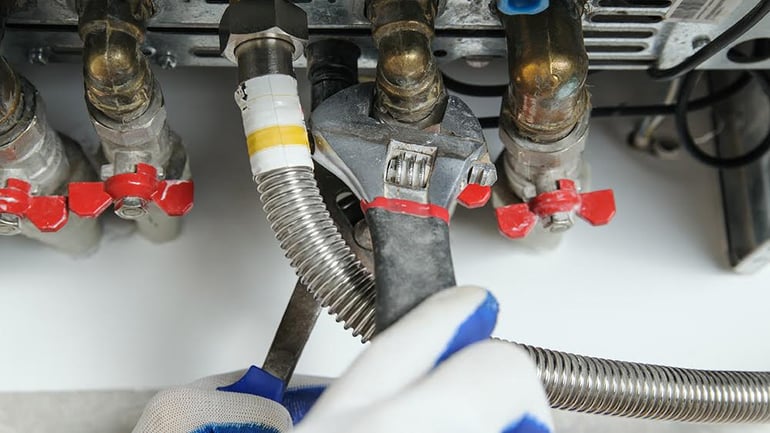 It's important to remember that boiler service is difficult and dangerous because boilers are complex machines that contain harmful chemicals.
It's important to remember that boiler service is difficult and dangerous because boilers are complex machines that contain harmful chemicals.
When it comes to changing your oil, doing your taxes, or fixing your thermostat, it's cheaper to do it on your own. However, when it comes to boiler repairs, don't try this at home!
- The flame isn't blue. The pilot light's color is the best starting point for diagnosing a boiler's problem. Surprisingly, the color of the flame can tell you exactly what's hurting your boiler's output.
For example, a yellow or orange color is warning you of inefficient boiler fuel or carbon monoxide. A red flame is a warning sign for tar, oil, or dust build-up in your HVAC system.
While the heating problem is tempting to resolve on your own, if the boiler is outputting carbon dioxide, your family's health is at risk. Because of this, leave it to professionals. - Strange smells. If you notice one of the following smells coming from your boiler, shut the system down and call an HVAC technician immediately:
- Egg Smell: This eye-opening stench is a sign of a weak burner or poor fuel performance. On the other hand, the boiler is leaking natural gas, which is harmful to your family.
- Moldy Smell: This is a sign of a foreign substance in your HVAC system or from a bacteria buildup in the flue pipe.
- Gas Smell: One diagnosis is a loose or faulty valve on the boiler. If you tighten the valve and still notice the smell, call an HVAC technician immediately. The boiler is reprocessing gas in the outflow system.
No matter the cause, a potential gas leak can't wait. The risk of a leak is dangerous to your HVAC and your family's health. Trust a technician to find the root of your heating problems.
- No heating or hot water. Similar to strange smells, a lack of heat or hot water is caused by a plethora of potential issues. If the diagnosis isn't a lack of fuel or a mismanaged thermostat, reset the HVAC system.
Find a red button near the unit, and hold it down for three seconds and then release. If you hear the unit start up, you found a temporary solution. Call a service technician.
HVAC System Tip: Don't press the reset button more than once to avoid extensive damage. - Water leaks. Water leaking from your boiler is caused by damage to the unit itself, including faulty valves, cracks in the body, and loose joints. While these seem easy to repair, it's recommended to hire a pro.
Throwing extra sealer on a crack or valve sounds like an easy fix, but you prolong a serious problem. Structural damage in a boiler can expand after continued use. - Temperature fluctuations. While abnormally cold water is uncomfortable, water that's abnormally hot causes severe burns. In a recent study, 112 degrees Fahrenheit is the ideal temperature for a home boiler.
If the temperature is set to 112 degrees, and you're still experiencing water fluctuations, this is a sign of a poorly sized boiler that has to work harder. This overworks the system leading to breakdowns and shortened lifespan.
On the contrary, an oversized boiler heats too quickly, causing the unit to be shut off before completing a full cycle. This shorten cycle negatively affects energy efficiency in your home. - Oddly high or low water pressure. High water pressure wreaks havoc on the internal workings of the heating system -- leading to leakage, damaged piping, and problems in jointed areas.
While lowering the water pressure seems straightforward, professionals have the ability to properly calibrate the system to avoid a persistent problem.
Low pressure is caused by a buildup of dirt in the aerators or strainers. This buildup can lower the unit's efficiency and life, so hire a professional to flush the heating system as part of annual boiler maintenance. - Loud noises. Commonly referred to as "kettling", banging noises from the boiler are caused by a buildup of limescale in the heat exchanger. This restricts the water flow causing water to expand inside the boiler.
A whistling noise is a result of trapped air in the heating system. A professional will be able to identify what's causing the trapped air.
A gurgling sound is a result of a frozen condensation pipe. This should be thawed quickly to avoid pipe damage.
Why risk causing extensive damage to the boiler by trying to solve a problem yourself? The financial benefit doesn't outway the potential dangers, so call a professional.
Warner Service has a checklist to help you stay organized with boiler maintenance:


